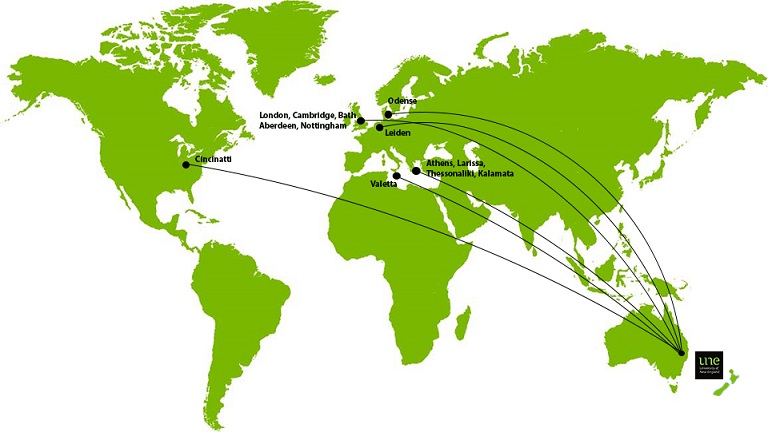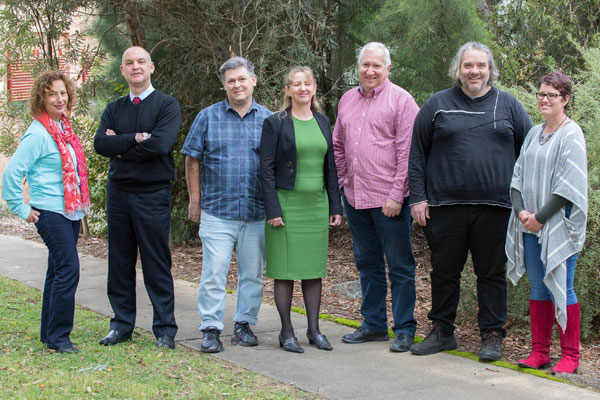Brain-Behaviour Research Group
The Brain-Behaviour Research Group is a collaboration of researchers from various backgrounds, who share an interest in understanding the links between overt and covert behaviour, brain processes and 'mental' disorders. Although several of the current research projects are concerned with basic biomedical issues and procedures, the overwhelming focus is upon the translation of the outcomes of these processes to clinical applications, particularly in mental health settings.
The BBRG's Major Research Foci are Depression and Autism Spectrum Disorder. Both human and animal studies are being currently undertaken, and specific projects include: Professor Chris Sharpley (UNE): Depression and anxiety as functional behavioural responses to overwhelming environmental stressors; Subtypes of Depression; Anxiety & depression among children with an ASD and prostate cancer patients. Professor Vicki Bitsika (UNE): Autism Spectrum Disorders; Anxiety and depression; Psycho-Oncology; Functional Behavioural Analysis. Professor John Sweeney (Uni Cincinnati): Autism; Family studies of psychotic disorders and autism; Neurocognitive abnormalities in schizophrenia, mood disorders and autism. Professor David Christie (GenesisCare Qld, UNE): Anxiety and Depression in Prostate Cancer patients. Associate Professor Nicholas Andronicos (UNE): Proteomic and genomic analysis of depression. Dr Mary McMillan (UNE): Genetic and biological markers of mental health disorders. Associate Professor Phillip Fourie (UNE): Patient-centred assessment and treatment of anxiety disorder. Dr Shabah Shadli; Biomarkers of Anxiety and Depression We currently have a number of excellent HDR students contributing valuable work to the research group. For further information on the Brain Behaviour Research Group, please contact: Professor Christopher Sharpley BBRG researchers have partnered with the NSW Department of Family and Community Services to run an IT Club out of the University of New England. The ASD-IT Club is helping local children and teenagers with Autism Spectrum Disorder make positive changes to their levels of anxiety, social interaction and the development of IT skills. Each session runs over a six-week period, and researchers are seeing substantial improvements in the social communication and interaction skills of the participants. Many children with Autism Spectrum Disorder (ASD) also suffer from anxiety to such an extent that they are unable to function well at school or in social situations. One of the aspects of their environment that these children find to be most distressing is an overload of sensory stimuli – sights, sounds, smells and touch. However, little is known about how their brains deal with this overload. In this research we work with children from the community who have been diagnosed with ASD. The research involves measuring the brain activity of these children while resting, and when exposed to sensory stimulation conditions, to better understand how the brain responds in different situations. The project aims to form a model that can be used to restructure classrooms, so that children with ASD can progress more successfully at school. Homelessness is a major social problem in many nations, and Australia is no exception. We are conducting research with Homes North Community Housing, a local housing provider, to measure the neurobiological and psychological impacts of homelessness. This research will help us to understand the severity of mental health problems among homeless people, in particular the effects of elevated anxiety and depression. Participants in this study are individuals living in social housing in Armidale, Glen Innes, Gunnedah, Inverell, Moree and Tamworth. The study will measure the changes that occur to homeless people when they are housed, and will also trial an intervention aimed at assisting previously-homeless people develop more effective social and employment skills. The Brain Behavior Research Group is working with a number of child care centres in a research partnership to develop and evaluate specialised evidence-based intervention for preschool children with autism. The BBRG has established community outreach research and training links with several places in Greece. Specific details can be found in the following links to our blog. The BBRG Research Internship Programme offers opportunities for students of all levels to become involved in novel research projects, on a volunteer basis. This programme will provide students with the opportunity to build their research and clinical/laboratory skills, whilst furthering research into the foci areas of the BBRG’s current research programme into Depression, at a pre-clinical and clinical level. So that they can benefit most from these Research Internships, students will need to make a regular commitment of their time, usually for a half or full day per week, with allowance for exam and vacation periods. These Research Internships fit within the UNE Policies and Regulations for such activities and represent a formal collaboration between UNE staff and UNE students. For more information on the BBRG Internships contact Professor Chris Sharpley, or individual members of the research group, for details of the projects available, and how to apply. BBRG has international collaborations across the world including the US, UK, Greece, Netherlands and Malta. For more information visit BBRG International Collaborations. For an up to date publications list please see the ResearchGate or GoogleScholar accounts of the individual researchers, listed above under Memberships and Research Interests.
Associate Professor Adam Hamlin (UNE): Preclinical studies of depression and anxiety.
School of Science & Technology
Email: csharpl3@une.edu.au
Phone: +61 2 6773 3596ASD-IT Club
Understanding the brains of children with Autism
Measuring the consequences of homelessness
ACE: The Autism Connect Early project
BBRG Community Outreach in Greece




